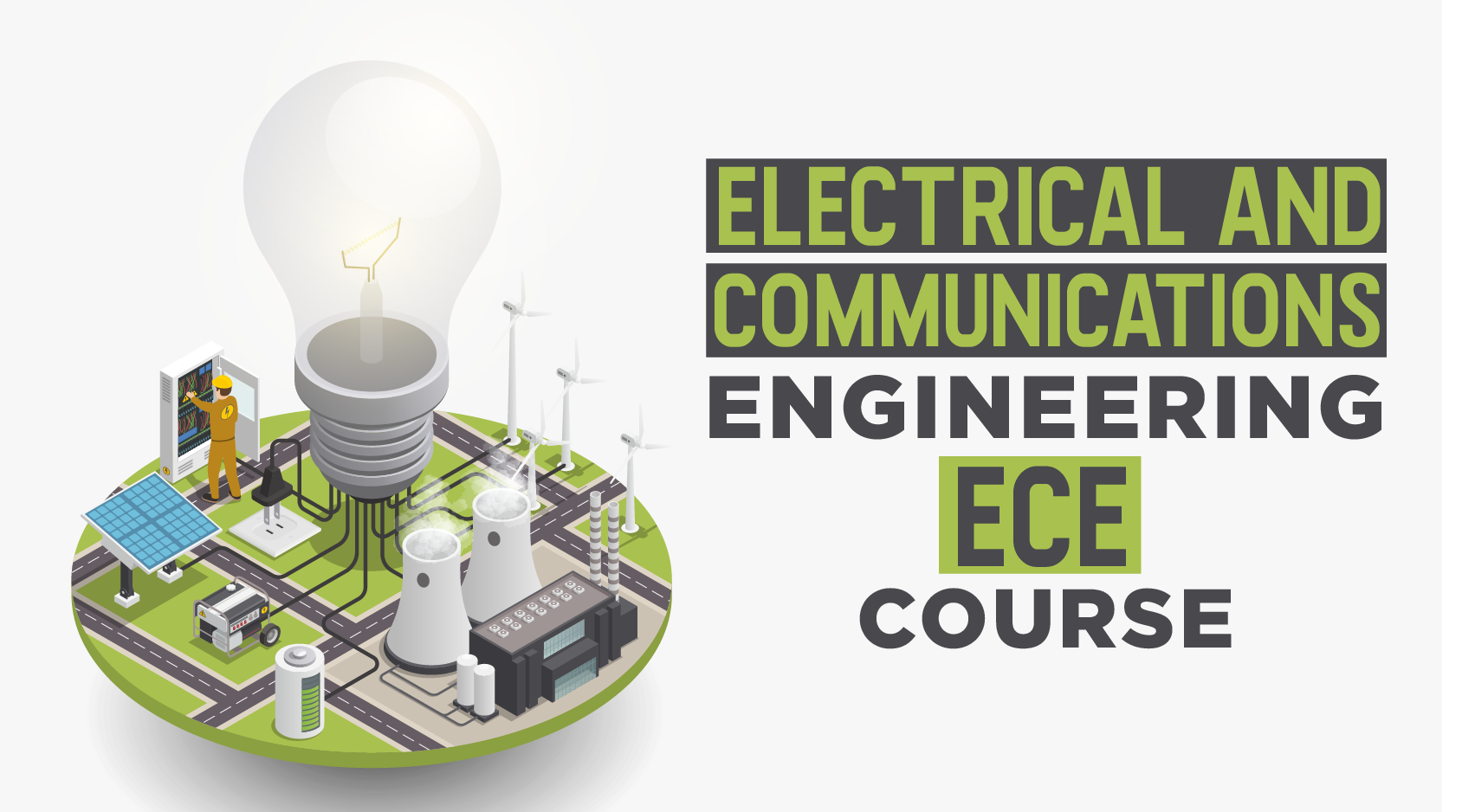Electrical Communication Engineering is a branch of engineering involving the study of Mathematical application & Scientific principles used in electronic systems. It is a combination of Communication and Electronics Engineering that focuses on developing, designing, and testing different types of electronics equipment.

The Electrical Communication Engineering program is designed to teach students about microprocessors, both digital and analog transmissions, different types of electronic tools or equipment, microwaves, satellite communication, etc. After the completion of the course, students can take advantage of numerous lucrative career opportunities provided in this field. Read the article to know its broad details.
What the course focuses on?
- Tools and techniques involved in developing electronic devices.
- Designing different types of electronic systems.
- Microwaves and their application.
- Details about satellite communication.
- Different types of broadcasting systems and their maintenance.
Highlights:
| Course Name | Electrical and Communications Engineering |
|---|---|
| Course Level |
|
| Duration |
|
| Examination Type | Yearly/ Semester |
| Eligibility | Varies with degree |
| Admission Process | Merit and Entrance based admission |
| Top Recruiter |
BEL, DMRC, Siemens, Texas Instruments, Intel, Nvidia, Philips Electronics, Motorola, Samsung, Conexant and Flextronics, DRDO, ISRO, Infosys, TCS, Wipro, Accenture, HCL Technologies, Tech Mahindra, etc |
| Top Career Scopes | Electronics Engineer, Field Test Engineer, Network Planning Engineer, Electronics and Communications Consultant, Customer Support Engineer, Electronics Technician, Associate Firstline Technician, Research and Development Software Engineer, Service Engineer, Technical Director, etc |
Top Colleges:
- Indian Institute of Technology (IIT), Kharagpur
- Indian Institute of Technology (IIT), Hyderabad
- Delhi Technological University, New Delhi
- National Institute of Technology, Surathkal
- IT, BHU (Banaras Hindu University)
- IIT, Guwahati
- College of Engineering, Pune
Eligibility:
| Course | Duration | Eligibility | Entrance |
|---|---|---|---|
| Diploma in Electrical and Communications Engineering | 3 years |
|
State or University level entrance exam |
| B.Tech in Electrical and Communications Engineering | 4 years |
|
JEE-Main, BITSAT, IPU CET, CET,etc |
| M.Tech Electrical and Communications Engineering | 2 years |
|
GATE, JEE-Advanced, JEE-Main, BITSAT, CET, etc |
Skills required:
- Critical thinking and complex problem-solving ability
- Should be an expert in instrumentation and electrical measurement.
- Interpersonal communication & Organizational skills.
- Knowledge of how to design digital filters.
- Strength in Mathematics and Physics.
- Leadership ability
- Technical knowledge & IT skills.
- Must have patient and management skills.
Syllabus:
Diploma in Electrical and Communications Engineering:
| Year I | Year II | Year III |
|---|---|---|
| Professional Communication | Applied Mathematics II 50 -52 | Industrial Management and Entrepreneurship Development |
| Applied Mathematics III | Electrical Engineering II 53 -56 | Environmental Education & Disaster Management |
| Applied Physics | Industrial Electronics & 57 -60 Transducers. | Communication System |
| Applied Chemistry | Network Filters & Transmission Lines | Electronic Instruments And Measurement |
| Applied Mechanics | Electronic Devices and Circuits | Construction Management, Accounts & Entrepreneurship Development |
| Engineering Mechanics & Materials | Principles of Communication Engineering | Audio and Video System |
| Electrical Engineering I | Principles of Digital Electronics | Television Engineering |
| Electronic Components and Devices | Electronics Workshop | Microprocessor and Application |
| Technical Drawing | Programming in C & C++ | Project -I. Problem |
| Elementary Workshop Practice | ||
| Computer Application for Engineering | ||
Electives (Any One)
| Modern Communication System | Microelectronics | Electronic Equipment Testing |
| Advance Microprocessor & Interface | Microwave & Radar Engineering | Modern Consumer Electronics Appliances |
| Bio-Medical Electronics | ||
B.Tech in Electrical and Communications Engineering:
| Semester I | Semester II | Semester III | Semester IV |
|---|---|---|---|
| Communicative English | Vector calculus and ordinary Differential Equations | Humanities Elective | Humanities Elective II |
| Calculus and matrix algebra | Chemistry/Physics | Value program | Values program II |
| Computational Thinking and Problem solving | Computer Programming | Linear Algebra | Probability and Random Process |
| Physics/Chemistry | Solid-state device | Network theory | Electronic Circuits |
| Physics/Chemistry lab | Fundamentals of Electrical technology | Electromagnetic Theory | Digital Signal Processing |
| Workshop A/ Workshop B | Chemistry lab/physics lab | Digital System | Transmission lines and Waveguides |
| Engg. Drawing- CAD | Workshop B/ Workshop A | Signals and system | Digital Signal Processing lab |
| Cultural Education I | Computer Programming lab | Digital systems lab | Electronic Circuits Lab I |
| Cultural education II | Signals and System labs | Soft Skills I |
| Semester V | Semester VI | Semester VII | Semester VIII |
|---|---|---|---|
| Optimization Techniques | Digital Communication | Environmental studies | Elective IV |
| Linear Integrated Circuit | Data communication and networks | Radiofrequency engineering | Elective V |
| Control Engineering | Computer organization and architecture | Information theory and coding theory | Project phase 2 |
| Communication theory | VLSI Design | Elective II | |
| Microprocessor and Microcontroller | Elective 1 | Elective III | |
| Circuits and communication lab | VLSI Design lab | Microwave engineering lab | |
| Microcontroller lab | Digital Communication lab | Project Phase I | |
| Soft Skills II | Open lab | Live In lab II | |
| Live-In- Lab | Soft Skills III |
Electives:
| Radar & TV Engineering | Cryptography & Network Security | Soft Computing Methods | Optical Networks |
| Antenna | Remote Sensing | Mathematical Tools for Electronics | Digital Signal Processing Architecture |
| Device Modelling & Simulation | Detection and Estimation Theory | Mine Electronics & Instrumentation | Operating Systems |
| Information Theory & Coding | Digital Image Processing | VLSI Design | Filter Design & Synthesis |
| Satellite Communication | EMI/EMC | Opto-electronic Devices | Optical Instrumentation & Measurement |
| Optical Network Security | Digital System Design | Fibre Optic Sensors | Biomedical Instrumentation |
| Advanced Signal Processing | Data-Based Management Systems |
M.Tech Electrical and Communications Engineering:
| Semester I | Semester II | Semester III | Semester IV |
|---|---|---|---|
| Modern Digital Communication Techniques | Microwave and Antenna Engineering | Open Electives (only one) | Thesis II |
| Information Theory, Coding, and Cryptography | Wireless Communication | Project Management | Seminar |
| Telecommunication Switching and Networks | Statistical Signal Processing | Project Costing | Comprehensive Viva-Voce II |
| Electives I (only one) | Electives III (only one) | Technology Management | |
| Adaptive Signal Processing | Radar System Engineering | Research Methodology | |
| Satellite Communication System | Digital Image Processing | Optimization Techniques | |
| Digital Integrated Circuit Design | Biomedical Instrumentation and Signal Processing | ||
| Mathematics for Communication Engineering | Optical Communication | ||
| Electives II (only one) | Wireless Sensor Network | ||
| Fibre-Optics Components and Devices | RF and Mixed-Signal Integrated Circuit Design | ||
| Computational Intelligence | Industrial Telematics | ||
| Analogue Integrated Circuit Design | Electives III (only one) | ||
| Semiconductor Device Modelling and Simulation Lab I | Embedded System Design | ||
| Communication System Engineering Lab | Mobile Computing | ||
| Seminar I-on Pre-thesis Work I | ASIC and SoC Design | ||
| Internet and Web Technology | |||
| Electives IV (only one) | |||
| Design and Simulation Lab | |||
| Seminar on Pre-thesis work II | |||
| Comprehensive Viva-Voce I |
Admission Process:
The admission process for a degree in Electrical and Communications Engineering may differ from one college to another. Therefore applicants should check the eligibility and admission criteria of a particular college before applying. There are some colleges that have a merit-based selection process where students are selected on the basis of the aggregate marks secured in the last academic session. However, the top institutes offer admission on the basis of the marks secured in the entrance exams (National/State/University level). Moreover, some institutes even conduct a personal interview round followed by the counselling rounds.
Top Entrances:
1. GATE (Graduate Aptitude Test in Engineering)
- Extended Closing Dates for Online Application (with late fee): 7 October 2020
- GATE 2021 Exam Dates: 5, 6, 7, 12, 13, 14 February 2021
- GATE 2020 Results: 22 March 2021
2. JEE Main (Joint Entrance Examination-main)
- Exam Duration: 3 hours
- Application Mode: Online
- Exam Mode: Online and Offline
- Exam Frequency: Twice a year
3. JEE Advanced
- Application Form: 12 September 2020
- Last date of the application form: 17 September 2020
- JEE Advance 2020 Exam Date: 27 September 2020
4. BITSAT (Birla Institute of Technology and Science Admission)
- Exam date: 16th - 18th and 21st - 23rd Septemeber, 2020
- Exam Duration: 3 Hours
- Mode of Exam: Online
5. SRMJEEE (SRM Joint Engineering Entrance Exam)
- Exam: Cancelled
6. IPU (Guru Gobind Singh Indraprastha University) CET
- Exam Level: National
- Mode of Exam: Offline (pen and paper-based)
- Question Type: Multiple Choice
Career Scope:
| Career/Job Profiles | Average Salary per Annum |
|---|---|
| Electrical Engineer | Rs 2.5 lakhs to Rs 3.5 lakhs |
| Aerospace engineer | Rs 3.5 to Rs 6 lakhs |
| Systems analyst | Rs 3 lakhs to Rs 6 lakhs |
| Instrumentation Engineer | Rs 3 lakhs to Rs 5.5 lakhs |
| Acoustic consultant | Rs 4 lakhs to Rs 6.5 lakhs |
| Research and Development Software Engineer | Rs 3 lakhs Rs 7 lakhs |
| Network Planning Engineer | Rs 4 lakhs to Rs 6 lakhs |
| Technical Director | Rs 4 lakhs to Rs 7 lakhs |
Top Recruiters:
| Company Name | Company Name |
|---|---|
| BEL | Samsung |
| DMRC | Conexant and Flextronics |
| Siemens | DRDO |
| Texas Instruments | ISRO |
| Intel | Infosys |
| Nvidia | TCS |
| Philips Electronics | Wipro |
| Motorola | Accenture |
| HCL Technologies | Tech Mahindra |
Top Recruiting Cities:
- Mumbai
- Bangalore
- Noida
- Pune
- New Delhi
FAQs:
Q: What is Electrical and Communications Engineering?
A: Electrical and communication are the disciplines under electrical engineering. It deals with the study of mathematical application & scientific principles to design and combine electrical and electronics systems. The development and communication technology are also a part of it.
Q: What are the career prospects available after Electrical and Communications Engineering?
A: The top career prospects are mentioned below:
- Electrical Engineer
- Aerospace engineer
- Systems analyst
- Instrumentation Engineer
- Acoustic consultant
- Research and Development Software Engineer
- Network Planning Engineer
- Technical Director
Q: What are the top entrances to consider for Electrical and Communications Engineering?
A: Some of the top entrances to consider are as follows:
- GATE (Graduate Aptitude Test in Engineering)
- JEE Main (Joint Entrance Examination-main)
- JEE Advanced
- BITSAT (Birla Institute of Technology and Science Admission)
- SRMJEEE (SRM Joint Engineering Entrance Exam)
Q: Who are the top recruiters in this field?
A: Some of the top recruiters in this field are:
- BEL
- DMRC
- Siemens
- Texas Instruments
- Intel
- Nvidia
- Philips Electronics











